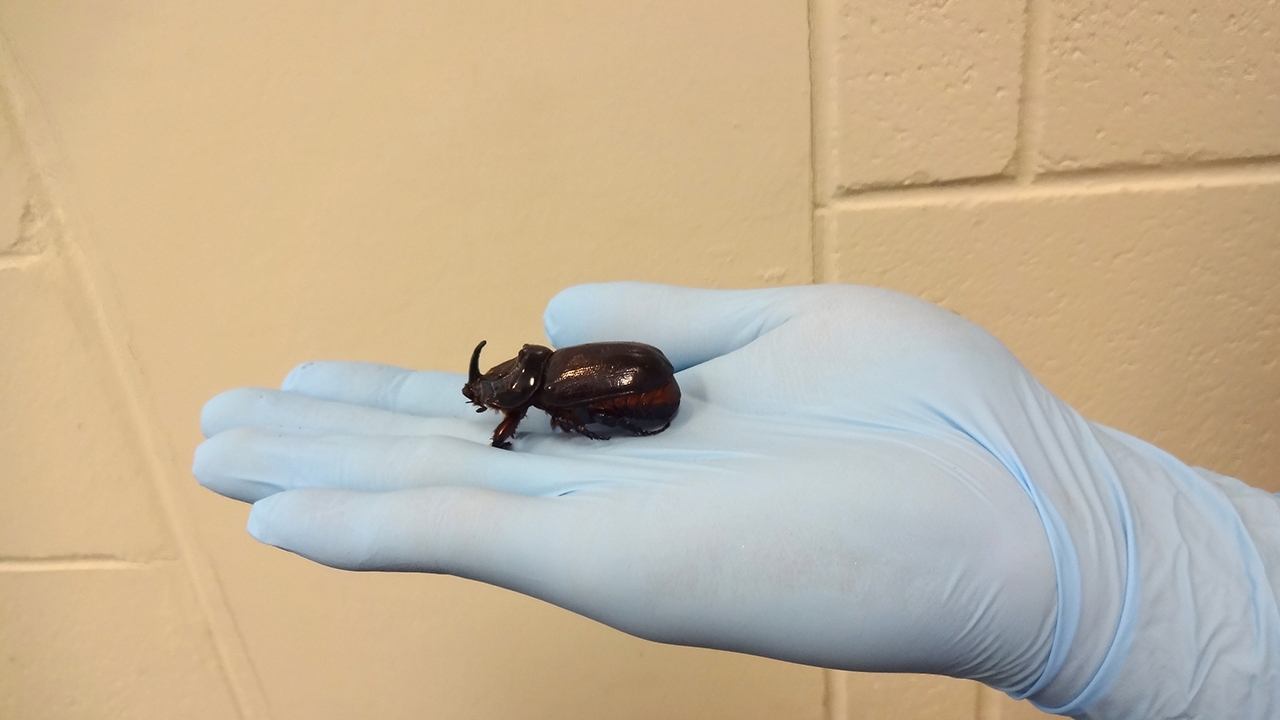Coconut Rhinoceros Beetle

The coconut rhinoceros beetle (CRB) attacks and damages coconut palms. It bores into the tops of trees and feeds on the sap which can significantly reduce coconut production and kill the trees. In addition, the CRB also feeds on economically important crops, such as bananas, sugarcane, papayas, sisal, pineapples, taro, and date palms. This pest is native to Southeast Asia and has spread throughout Asia and the Western Pacific.
In 2013, CRB was found in a pest survey trap in Honolulu, Hawaii. We work with the Hawaii Department of Agriculture, the University of Hawaii at Manoa and other partners to survey, trap and manage CRB.
You can protect coconut palms from this damaging pest. Here's what to look for:
- Appearance
- Adult beetles are a brownish-black color and have a distinctive horn projecting from their heads. They are big, shiny and stout, measuring about 2 inches long and 3 quarters of an inch to almost an inch wide.
- Larvae
- Also called grubs, the larvae are usually a yellowish-white color. They can be quite long, reaching almost 4 inches or more. They feed and develop in dead, standing coconut trees and fallen coconut logs, or other types of decaying organic mulch.
- Holes
- Adult CRBs create holes in palm frond stems. Typically, the holes span the width of at least two fingers. You may also see coconut fibers around the areas.
- V-shaped damage
- The V-shape could be right side up or upside down, resulting from CRBs boring through developing leaves on palms trees. Younger palms are more vulnerable than mature ones.
If you live in Hawaii and you see the beetle or beetle damage, report it immediately. Visit CRBHawaii.org to see photos of the pest and the damage it causes and to learn about its lifecycle.
If you live in Hawaii, take these steps:
- Allow authorized agricultural specialists access to your property to look for CRBs, inspect mulch piles and hang traps. The traps, equipped with pheromone lures and solar powered UV/LED lights, are scentless and harmless to humans and pets. Survey specialists service traps every one to two weeks.
- Invasive pests can hitchhike in international cargo and passenger baggage. When you return from international travel, declare all agricultural items.
- Fresh fruits, vegetables or plants shouldn't be brought or mailed to Hawaii unless agricultural inspectors have cleared them beforehand.
Contact Coconut Rhinoceros Beetle Response if you suspect your palm tree is infested or want to know more about what is being done in your area.
Report Plant Pests and Diseases
If you're in Hawaii, contact the Hawaii Department of Agriculture’s Pest Hotline by calling or texting 808-643-PEST (7378) or emailing info@crbhawaii.org. If you're in the continental United States, contact the plant health director in your State.

